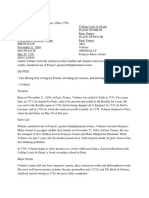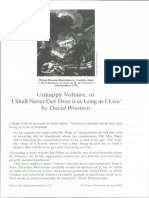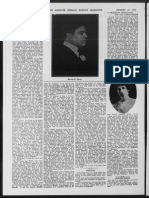1
Voltaire:
Conscience of an Age
BY FRANCIS LEARY
T WAS a gala night at the Comédie Française. Just before the curtain rose on the new tragedy Iréne, a wizened old man entered his
I box and the audience rose with a spontaneous roar. Shouts of "Vive Voltaire! Vive Voltaire!" swept the packed theatre. An actor
placed a wreath of laurel on his head. "Do you wish me to die of glory?" the 84-year-old playwright asked, tears streaming. It was
March 30, 1778. The celebrated author was back at last in his beloved Paris, from which he had been exiled for a third of his life.
Savant, man of letters, counsellor to the great, defender of the poor and victimized, Voltaire had labored for 60 years to drag Europe out of the
morass of medieval ideas and institutions. As the conscience of his age, he had fought injustice, bigotry, privilege and religious fanaticism with
telling effect. In fact, the eighteenth-century Enlightenment is today known as the Age of Voltaire. More than any other critic, Voltaire helped foster
the social ferment that eventually erupted into the French Revolution. Yet he never preached violence: he was for reform, peaceful change under an
enlightened monarch. "Liberty," he proclaimed, "consists of dependence on nothing but law." A superbly witty artist with words, he became the
most widely read
writer of his time, a satirist who used the stinging arm of ridicule to make his philosophical points. Of his enormous literary production, 15 million
words survive including 20,000 delightful letters, and humorous works like Candide that are still enjoyed throughout the world. We owe to him such
aphorisms as "embarrassment of riches, "Common sense is not so common," and "If God did not exist, He would have to be invented."
Christened François-Marie Arouet, he assumed in his twenties the more distinctive "Voltaire," probably from his school nickname Mon sieur
Volontaire (Mr Wilful). His father, a prosperous Paris notary, sent him to the elite Jesuit College of Louis-le-Grand, and afterwards insisted that he
prepare for the bar. But when his father offered to purchase him a post as a royal advocate, Voltaire rejoined, "I will make a position for myself that
costs nothing."
Opening Salvo. France in 1715 was just emerging from the interminable 72-year reign of Louis XIV. Voltaire, at 21, detested a regime which forbade
free speech and worship, sold high offices, and left nobility and clergy exempt from the crushing taxes. While a law clerk he had written his first
play, Oedipus, peppered with scathing allusions to tyranny and bigotry. With this play he hoped to establish himself
as a writer. To get it approved by the royal censor, Voltaire went straight to the top. He turned for support to the Regent, Philippe, duke of Orléans,
an intelligent broad-minded man who liked to bask in the company of poets. On his recommendation, Oedipus was promptly accepted.
� 2
Believing truth could emerge only from a free exchange of ideas, Voltaire, despite his royal patronage, continued to attack the regime's injustices in
pamphlets written under assumed names. He went too far when he satirized the Regent's libertine personal life. The young gadfly was thrown into
the Bastille for 11 months - then released just in time for the première of Oedipus. It broke box-office records at the Comédie Française. At 24,
Voltaire was famous.
The new dramatist sparkled in French society. In his emerald coat and loose-fitting wig, he frequented Paris salons and great chateaux, delighting
his hosts with his rapier wit. Although his bony 160 centimetre figure and his sharp features were hardly seductive, Voltaire's charm beguiled simple
girls and society matrons alike. Quick to resent arrogance, he repeatedly clashed with the privileged.
When he developed a passion for the actress Adrienne Lecouvreur, he found he had a rival: the Chevalier de Rohan, scion of one of France's noblest
families. One night Rohan burst into the theatre box where Voltaire and the glamorous Adrienne were sitting and scoffed: "Mon sieur Arouet?
Monsieur Voltaire? What really is your name?" "Voltaire," the other retorted. "I am the first of my line as you are the
last of yours!" A few nights later he was set upon by six lackeys armed with staves, while Rohan stood by. Voltaire escaped with bruises but, enraged,
let it be known that he would challenge Rohan to a duel. A nobleman could hardly fight a commoner, yet if he refused, all Paris would say he was
afraid. Rohan's influential family solved the problem by having Voltaire returned to the Bastille.
From prison he wrote an account of the broil, saying that he had been assaulted by Rohan "helped by six cut-throats behind whom he had
courageously posted himself. Since then I have sought to restore not my but his, which has proved too difficult." And he offered to go to England if
set free. The authorities released him.
Voltaire was received in the best circles in England and spent three years there. He became the first French writer to speak English fluently, the first
to translate Shakespeare. His stay was also a financial success: his verse epic Henriade, on Henri de Navarre, sixteenth-century leader of France's
persecuted Protestant Huguenots, was hailed as a national epic, and earned him £ 1,250, a considerable sum in those days.
Final Insult. Back home by permission of Louis XV, his struggle with the Establishment flared anew when Adrienne Lecouvreur, mortally ill but
playing in a Voltaire tragedy to the last, died in the author's arms. In accord with Church practice towards the profane theatre, the police secretly
took her body to a common burial ground. Voltaire was outraged: he had seen a popular English actress buried in Westminster Abbey. He penned
an ode to his dishonoured mistress, and then wrote the English Letters which vaunted Britain over France in every sphere: religious tolerance,
government, finance, science, medicine, literature.
The Letters hit French opinion in 1734 like a bombshell. The work was burnt by the public executioner and a warrant issued for Voltaire's arrest but
he eluded the police. Banished from Paris, he found refuge with an admirer, Emilie, Marquise du Châtelet, at her chateau in Champagne.
A noted student of mathematics and physics, the marquise broadened Voltaire's interest in science, Mornings, Voltaire would go shooting while
afternoons he worked on a monumental historical study. The Century of Louis XIV, or on his Elements of Newton, written under Emilie's influence.
In the evenings, when guests were present, he staged amateur theatricals, delighted to appear in roles from his own plays.
� 3
History till then had been considered the record of divine inspiration operating in human affairs. Voltaire took a radical new departure: history was
what men caused to happen. Most of Europe felt that civilization began with the empire created by Charlemagne. Voltaire, in his Essay on Universal
History, pioneered the very modern concept of comparative civilizations, including 4,000 years of Chinese culture. His approach transformed the
writing of history.
With the aristocratic Emilie's help, Voltaire worked his way back into court vour and was appointed Historiographer-Royal. But, as always, he ruined
his good fortune by his fatal habit of speaking his mind, so when Emilie died in 1749, he accepted an appointment as royal Chamberlain to Frederick
the Great of Prussia, the artistic and sensitive sovereign who longed to bring enlightenment to the Court of Potsdam. But on the throne Frederick
proved himself as warlike, wily and unscrupulous - and avaricious - as any of the tyrants Voltaire had excoriated. Inevitably, their egos clashed and
Voltaire described his task of correcting Frederick's poems as "washing the king's dirty linen."
Fertile Mind. Since his service with Frederick was regarded by Louis XV as disloyal, returning to Paris was out of the question. Instead, Voltaire
bought the estate of Ferney, conveniently near the Swiss frontier, enabling him to skip across to his residence of Les Délices (now a Voltaire
Museum) near Geneva when his writing aroused French authorities. At Ferney he created a model town and farms, introduced scientific reforestation,
imported silkworms, and with a group of skilled Geneva watchmakers, refugees from Calvinist intoler ance, started a watch factory. Catholic and
Protestant lived together amicably at Ferney, while their patron publicized his products all over Europe, selling watches to Catherine of Russia and
the Sultan Turkey.
At Ferney with its stuffed leopard and busts of Newton and Locke, he worked tirelessly. He contributed to the famous 17-volume Encyclopedie. He
fought an epic war or words with the social thinker Jean-Jacques Rousseau, who preached that the original, ideal state of nature had been corrupted
by organized society. Voltaire defended reason and scientific progress. At 84, he longed to see Paris once more. The ministry of Louis XIV
waived their objections. And so the old man came home. Two months after the triumph of Iréne, he died. Eleven years later the French Revolution
swept away the Bastille, and with it the regime whose oppression he had fought throughout his life. The Revolution's leaders knew the debt they
owed Voltaire. In 1791 his body was brought back to Paris: 100,000 people followed the procession, and several hundred thousands watched him
being re-buried with national honours in the Pantheon.
He would doubtless have disapproved of the Revolution's later excesses, but he would have been proud of the inscription it placed on his tomb: "He
taught us how to become free."
To Say or Not to Say
GERMAN Foreign Minister Gustav Stresemann was supposed to make a speech in parliament. The day before, a friend found him deep in thought.
"I bet you are thinking about what you will say tomorrow in the Reichstag." said the friend. "Wrong", said Stresemann. "I am thinking about what I
must not say under any circumstances."
-Janik Press Service
� 4
That Is Why
WAR HAPPENS inside a man. It happens to one man alone. It can never be communi cated. That is the tragedy-and perhaps the blessing. A thousand
ghastly wounds are really only one. A million martyred lives leave an empty place at only one family table. That is why, at bottom, people can let
wars happen, and that is why nations survive them and carry on
-Eric Sevareid, Not So Wild a Dream
Not Found Yet
HENRY FORD in a 1929 interview. "We can get fuel from fruit, from that shrub by the roadside, or from apples, weeds, sawdust-almost anything!
There is fuel in every bit of vegetable matter that can be fermented. There is enough alcohol in one year's yield of a hectare of potatoes to drive the
machinery necessary to cultivate the field for a hundred years.
"And it remains for someone to find how this fuel can be produced commercially better fuel at a cheaper price than we now know!"
-Quoted by Merilyn Mohr in Harrowsmith, Canada























































































